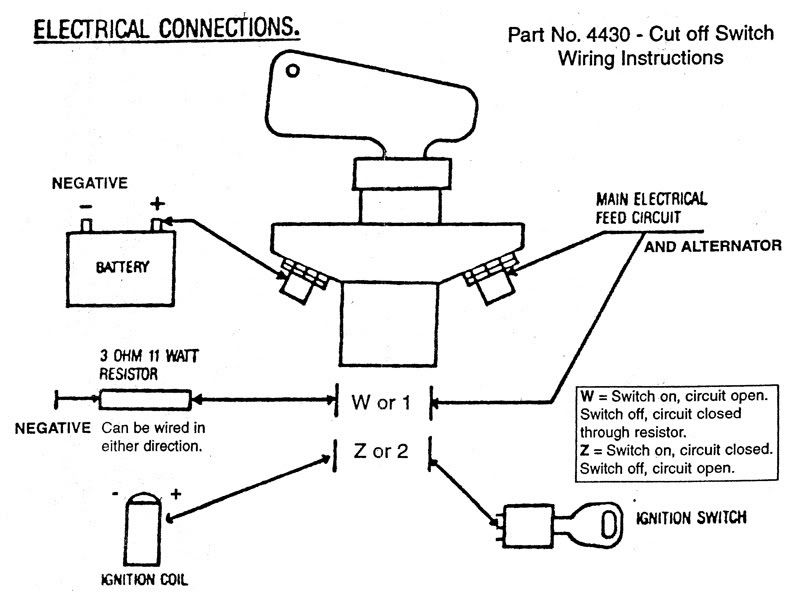 . Connect the alternator and any permanent memory (clock/radio etc) to the Input.
Everything else is connected to the other terminal "the Output".
. Connect the alternator and any permanent memory (clock/radio etc) to the Input.
Everything else is connected to the other terminal "the Output". Open isolator - car stops as does fuel pumps etc

Fitting a single pole (2 post) Isolator to Kitcar.
How should it be wired/connected, if the battery is disconnected the engine will still run whether Neg. or Pos. is disconnected.
Pos side has 3 cables, (Main feed to Starter Sol), (Alternator charge) and (fused feed) unsure where to.
Neg side 1 cable (Chassis earth).
So how should I wire this to kill the engine/power with battery still connected in the event of an emergency.
thanks
Battery positive to one terminal (Call that "Input" . Connect the alternator and any permanent memory (clock/radio etc) to the Input.
Everything else is connected to the other terminal "the Output".
. Connect the alternator and any permanent memory (clock/radio etc) to the Input.
Everything else is connected to the other terminal "the Output".
Open isolator - car stops as does fuel pumps etc
My isolator is on the negative side, for the only reason that it was much easier, and avoids wasted lengths of positive cable
never had any issues with it
steve
Thanks,
Steve m
To be honest, the isolator is already fitted to the Neg. side of the battery and by chance found that turning off the Isolator didnot stop the engine
when it was already running.
Theshed
So by connecting the Batt Pos and Alternator to isolator (input) terminal and the (output) terminal to the supply to fuel pump, ign. switch and lights
etc.
Do you mean leaving the Pos. cable as it is to the Starter soleniod and take a link supply from battery alongside the alternator cable to the Input
isolator terminal.
thanks
[Edited on 6/2/17 by sooty]
If this was the case then you you have another earth in the car, switching the negative will cut all the power as you need pos and neg to run your
circuits. Check for others earths I personally think it's best to isolate the earth as the other way around if you have a fault the car could
still become live as the chasis is earthed.
But dont listen to me im usually wrong lets hope someone else agrees with me.
quote:
Originally posted by sooty
Thanks,
Steve m
To be honest, the isolator is already fitted to the Neg. side of the battery and by chance found that turning off the Isolator didnot stop the engine when it was already running.
Theshed
So by connecting the Batt Pos and Alternator to isolator (input) terminal and the (output) terminal to the supply to fuel pump, ign. switch and lights etc.
Do you mean leaving the Pos. cable as it is to the Starter soleniod and take a link supply from battery alongside the alternator cable to the Input isolator terminal.
thanks
[Edited on 6/2/17 by sooty]

Got me thinking. And a few others I guess
10 years ago I recall I put my isolator on the batt -ve, for the right reasons, but don't remember testing this. (Bec so slightly more
different)
So now I suspect ther is a possibility that the isolated will defiantly prevent it being started, bur, as described, it could continue to run once
started.
Will be testing at the weekend!
Battery Isolator/FIA cutout should kill the engine and all electrical power.

Make sure you fit the resistor or you will likely fry the alternator if you turn it off with the engine running.
quote:
Originally posted by ReMan
Got me thinking. And a few others I guess
10 years ago I recall I put my isolator on the batt -ve, for the right reasons, but don't remember testing this. (Bec so slightly more different)
So now I suspect ther is a possibility that the isolated will defiantly prevent it being started, bur, as described, it could continue to run once started.
Will be testing at the weekend!
My isolator switch is more for security, and isolating the car when parked up, ie winter 
steve
Out of interest....
In a bec, how should an FIA isolator be wired?
I'm going to be fitting one to mine which will be kind of used as an ignition key too.
I was thinking just run the +ve from the battery to the isolator and then from the isolator out to the circuits.
I don't have an alternator as such so guess that is just left? no need for the resistor etc?
Would this still turn my engine off if the isolator was turned off? it would kill power to the coils etc...